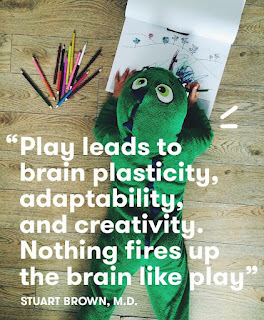This game is hosted by Vinitha Dileep, on her blog 'Reflections' and
I discovered it on Esha's blog. This time the word prompt is 'PLAY'

 |
| "Este un talent fericit sa stii cum sa te joci" |
It is the word that I include quite often in my posts, because of the games I participate in,
whether they are with images, with text or with small creations. But I think it reflects
something more. It could be a thread always intertwined with our path. It obviously starts
from childhood, the period in which the play is an essential method to discover the world unfolding in front of the eyes, eager to decipher the unknown. As we grow up and we are
bound by the rules, the idea itself seems to fade and only external situations trigger it. Fortunately, they are produced, but it is unclear to me if it generates the same sensations
and emotions as when we were kids. How do we externalize the joy of discoveries, being
adults? Is it the same joy of the play? The same magic when we get the answer we are
looking for? Do we still consider these explorations part of a play?
Or are we extremely serious in our great self-forgetfulness?
 |
| "Jocul conduce la plasticitatea creierului, adaptabilitate si creativitate. Nimic nu aprinde mai mult creierul ca jocul". |
Este cuvantul pe care il includ destul de des prin postari, din cauza jocurilor
la care particip, fie ca sunt de imagini, cu text sau cu mici creatii. Insa cred ca
oglindeste ceva mai mult. Ar putea fi un fir mereu impletit cu drumul nostru.
Porneste evident din copilarie, perioada in care jocul este o metoda esentiala de
a descoperi lumea ce se deruleaza in fata ochilor avizi de a descifra necunoscutul.
Pe masura ce crestem si suntem incadrati in reguli, ideea in sine parca se estompeaza,
si doar situatii exterioare noua il mai declanseaza. Din fericire se produc, insa mi-e
neclar daca el genereaza aceleasi senzatii si emotii ca atunci cand eram pitici.
Cum ne exteriorizam bucuria descoperirilor, adulti fiind? Este aceeasi bucurie
a jocului? Aceeasi magie cand obtinem raspunsul cautat? Mai consideram aceste
explorari ca parte a unui joc? Sau suntem extrem de seriosi in marea noastra
uitare de sine?
 |
| "Jocul este cea mai inalta forma de cercetare" |
#Fiction Monday (141) - Just a thought
Cred ca, pana la urma, jocul este ceva innascut. Ceva ce ar trebui sa nu ne lipseasca :). E benefic, daca ne gandim mai bine.
RăspundețiȘtergereAcum depinde insa si cum ne jucam - pentru ca jocul autentic, ar trebui sa implice inventivitate, entuziasm, curiozitate, creativitate... si ar trebui sa fie constructiv, recreativ... relaxant.
:)
Pupici cu drag :)
Asa cred si eu. Si mai cred ca ne-ar fi infinit mai util sa actionam oricand, ca si cum participa la un joc pe care sa-l exploram cu multa pasiune. Insa de multe ori uitam latura asta si efectele muncii noastre sunt mult diminuate. Asa mi se pare.
ȘtergerePupici si o saptamana pe placul tau, draga Rux! ❤️😘
Yes, play does keep the brain active no matter the age!
RăspundețiȘtergereIndeed, this is the idea. Those people who say that aging generates... whatever, they really forgot to play!
ȘtergereHave a fabulous week, Brian, full of games together with your friends!
Ţine enorm de felul în care suntem construiţi sau cum ne-am lăsat modelaţi de ani. Nu oricine se mai poate juca după o vârstă, nu oricine se mai ştie juca. Şi forţat nu merge. Şi joaca trebuie să fie în noi, altfel nu prea merge.
RăspundețiȘtergerePotecuta, eu cred ca jocul este oricum in noi, trebuie doar sa cautam, sa mai gandim, sa ne mai reamintim ce faceam cand... Este metoda principala prin care copiii afla lucruri. Asa suntem creati. Doar ca mai uitam.
ȘtergereUn start bun in ultima luna de vara, draga Potecuta! ❤️😘
It's not wise to take the play element out of any activity, is it? Well said, Suzana. Happy to have you join for another edition of Fiction Monday. Havely lovely day. ❤️😊
RăspundețiȘtergerePlaying is the most useful activity if we think deep.
ȘtergereThank you, Vinitha! All the best to you! Hugs!❤️😘